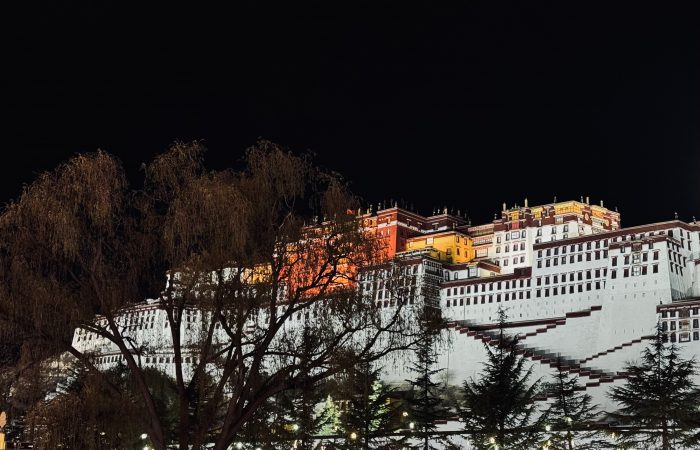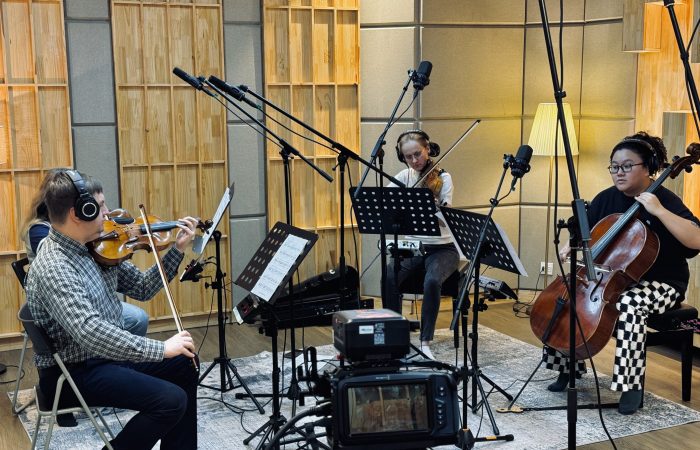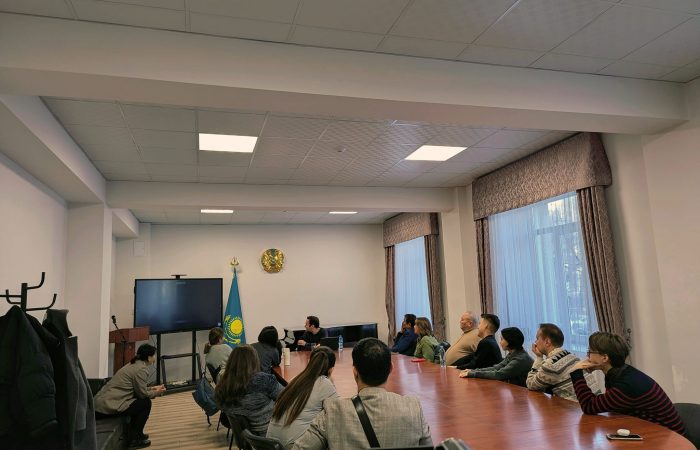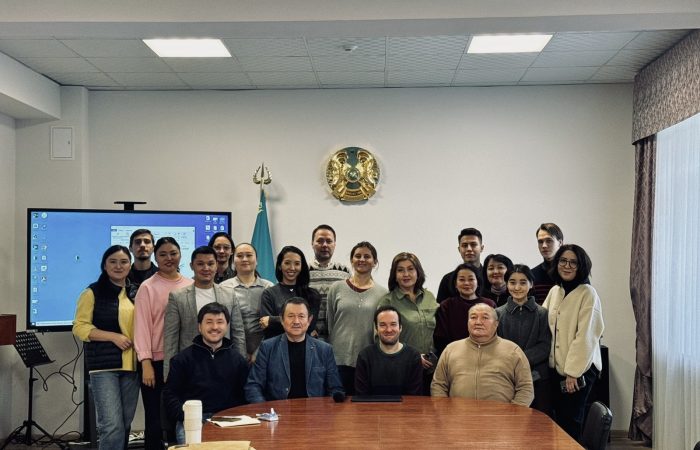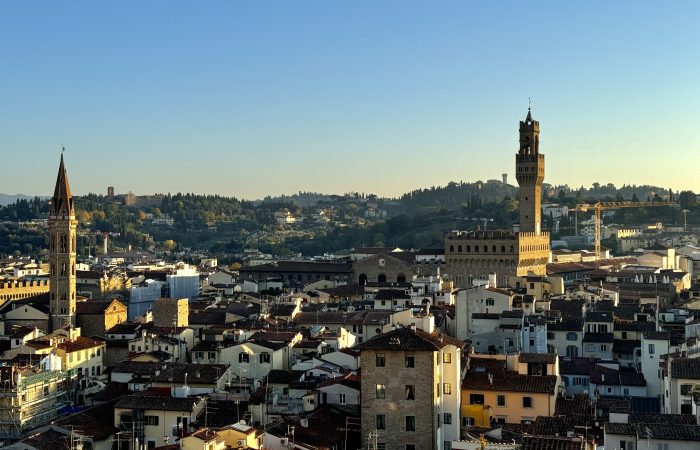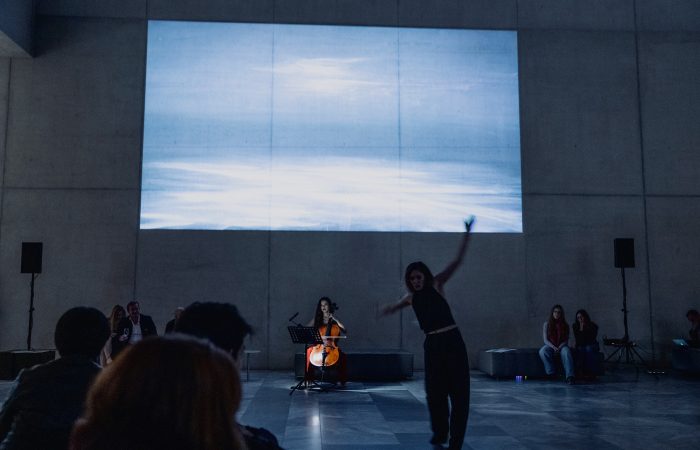
Contact
Blog
19 April 2025
Baku, Azerbaijan
The Once and Future (2021) is finally, finally coming to Europe next weekend– a new staging by my friend and colleague Giorgio Biancorosso, an amazing, truly tour-de-force costume by Bruno Birmanis produced by Helena Lumelsky at ARTISAINT Atelier, and of course, the brilliant musical forces of Anandi Bhattacharya, Stanley Dodds, and the Berliner Philharmoniker musicians.
After a truly busy first few weeks of April in Hong Kong, I’m midway to Antwerp, more or less, in the prosperous and energetic capital of Azerbaijan: Baku. My mission is much like that in Kazakhstan a few months prior, just with far more balmy weather- to promote the Academy of Music and recruit the next batch of talented students from the rich musical tradition here. Baku, of course, sits at the confluence of various (Persian, Russian, Ottoman) cultures but is thoroughly modern, and thanks to one of the largest oil reserves in the region, has a rather useful economic base. Indeed, the land on top of which my hotel sits was not so long ago a hub for oil drilling. Now dubbed “White City”, it represents a reawakening for a city and nation positioning for a bright future. Hong Kong could borrow some branding ideas.
After Antwerp, and some days off, I’ll be in Berlin for the German premiere of Russia : Today (2020) at the INTO THE OPEN festival with EXAUDI as well as some further developments for a new and very exciting multidisciplinary project deeply tied to the city. One rarely gets to relive spring twice in one season, but after some incredibly pleasant weeks in Hong Kong and being witness to the sunshine reflecting off the Caspian Sea (which I see for the first time in my life), it’s a privilege to experience a life only a musical career can truly provide.
30 March 2025
Hong Kong, HKSAR
This past week, we premiered HORIZON (2025), which features the second movement of my String Quartet no. 2 (2024-25), at JUMPSTARTER, an Alibaba Group-sponsored event here in Hong Kong. The work had a funny path- the film, by Alejandro Rodriguez, was a bit of a moving target when I composed a four-minute score which we recorded in Hanoi, Vietnam earlier this month with AURA String Quartet– and then, as the immersive (3D, 180-degree) film took shape, I turned to Anandi Bhattacharya to produce and really shape the track, adding sound effects, mastering the work, and generally finessing the material to the point that the work sounds entirely well-rounded. The goal was really to propose a romantic image of the future, a sort of melancholic, HG Wells-ian vision on science fiction. I hope it does come off that way.
Earlier this month, also, I spoke at the Hong Kong Arts Administrators Association annual convention, this year titled “The Future of Cultural Management,” as part of a panel on – you guessed it – artificial intelligence. It was my first time joining this highly influential group and, incidentally, getting to meet many people from Hong Kong and regionally that I don’t necessarily run into on a daily basis! That, accompanied by visiting guests and great friends and preparing for the European premiere of The Once and Future (2021), has meant an incredibly busy and not-always productive time. So it was just especially nice to experience HORIZON coming to fruition in such a meaningfully collaborative way, and under Jeffrey Shaw‘s conceptual vision, I’m proud of the results.
This spring is getting incredibly busy, as is the longer-term future. The European revival and tour of En vertu de… (2021) will take place in February-March 2026 and preparations for Russia : Today (2020) as part of INTO THE OPEN festival are quite advanced by now- stage director Sergej Morozov shared his own perspective on the project in a recent Russian-language radio interview here. While these seminal works (of mine) receive new leases on life, I am turning to the next major projects, collaborations both in Hong Kong and abroad, on which I’ll share more information soon!
11 March 2025
Hong Kong, HKSAR
Funny- one year ago just here I wrote about completing a new string quartet movement and somehow already twelve months have passed since that B major chord and it’s time to resolve it. The new work is directly related in that it follows that first movement, commissioned by Quatuor Arod, but the end deliverable is truly a polar opposite. This will serve as the score of an immersive, 3D video created by Alejandro Rodriguez for JUMPSTARTER, an Alibaba event to be held in Hong Kong later this month. The score, indeed the second movement of the String Quartet no. 2 (2024-25), was written in barely a week and recorded by the AURA String Quartet in Hanoi, Vietnam. It’s a hugely quick turnaround but, indeed, a new addition to the portfolio and yet again, something wholly new for me.
Hanoi was breezy and cool, a great contrast to the monsoon’s game of chess these days in Hong Kong. But it was also a chance to discover the city anew and properly, given that my only other time in Vietnam was a brief birthday trip in 2018 where Hanoi served as a brief transit point for a two-day cruise in Ha Long Bay. Discovering this cosmopolitan and rather gritty city now, amidst Vietnam’s economic boom, was really the perfect brief dash away from Hong Kong. And working with the AURA String Quartet, a new and excellent group based in Hanoi, gave those light and happy touristic days an added weight of musical accomplishment.
Next week I’ll be speaking at the HKAAA on the topic of AI in cultural management and leadership and, alongside that, in final preparations for the European premiere of The Once and Future (2021) in Antwerp, Belgium with the Berliner Philharmoniker musicians conducted by Stanley Dodds with, of course, the incredible vocalist Anandi Bhattacharya singing the solo role. This time, I am also tremendously proud that a new and truly tour-de-force costume has been designed for Anandi by the cult Latvian fashion designer, and my namesake of sorts, Bruno Birmanis. Beyond being simply the European premiere of the work, I see it as a fresh start for the work in a particularly appropriate venue- de Singel in Antwerp, Belgium.
21 February 2025
Hong Kong, HKSAR
Two years ago, Russia:Today (2020) got its much-anticipated debut in London at Kings Place: sold out, covered by the New York Times and Financial Times in big feature articles, and criticised by some quacks too. I’m delighted to finally announce that the work will return to the stage on May 10th, 2025 in Berlin, Germany as part of the INTO THE OPEN festival at the Kühlhaus, with the spectacular EXAUDI performing, James Weeks conducting. Every time this work is performed, it seems, the global political situation, vis-a-vis Russia especially, has changed. Now, again, with Russia rumoured to declare victory over Ukraine, and a ‘compromise’ that indeed may affirm such a ludicrous statement, the work has a particular resonance yet again. To bring it to Berlin, the world capital of classical music, is also a statement of intent on the work’s currency. I not-so-humbly believe that no ‘concert for Ukraine’ or some such thing possesses more resonance or sheer shock value than hearing the truth of Russian people about their country on the eve of its violent attack on its neighbour.
The other exciting bit of news is that I’ve continued writing the String Quartet no. 2 (2024-25) and added a second movement- modestly slower but similarly intense (if not more so), the work is meant specifically to accompany an immersive film by the Argentine filmmaker Alejandro Rodriguez, curated by Jeffrey Shaw. The four minute piece will already be recorded next month in Hanoi, Vietnam by the AURA String Quartet, and I look forward to sharing the results soon.
Finally, I’ll be speaking at the HKAAA Cultural Leadership Summit next month as well about the role of AI in cultural management. The proliferation of not only AI but the question about it has been rather interesting, to say the least. We are questioning that with which we haven’t even properly interacted; AI has yet to properly challenge us either. But the questions are germane and valid- when so much of the future has so little place for humanity in it, it’s perhaps important to start asking the big questions early.
3 February 2025
Hong Kong, HKSAR
A second new year has passed in barely a month – the lunar new year or, as it’s always referred to here as Chinese New Year – and with day after day of beautiful, occasionally chilly weather in the city, it feels as if spring is already at the doorstep. This consistent time in Hong Kong has given me a series of beautiful sunsets to admire from the new apartment and a newfound appreciation of Hong Kong from what was my very first neighbourhood when I moved here in 2017, a whopping eight years ago. The amount of ambitious and exciting projects, great and lifelong friends, and, finally, a true home in this place seems to confirm that the time has not gone to waste.
APPARITION keeps racking up views, passing ten thousand on Instagram and three thousand on Facebook. But while the success of its virtual distribution has been highly encouraging, I’m also excited that the European premiere of The Once and Future (2021) is approaching closer and closer (see it on the Calendar page as well), and very soon to be announced, the German premiere of Russia : Today (2020) with EXAUDI at the Kühlhaus, Berlin as part of the Into the Open festival. The former will be a new staging by Giorgio Biancorosso with a brand-new costume developed with fiberoptic technology from Lumigram and a design by Bruno Birmanis, a collaboration about which I’m tremendously excited!
There are also some great developments in Hong Kong, too, with the official opening of the new Academy of Music building just weeks away, and planning for the 2026 Asian premiere of Os dias mais longos e os mais curtos (2022) also in advancing stages. That piece, coming off a three-year period of intense productivity for me, seemed (and perhaps, still seems) like it said it all. And in that moment of dark depths of the pandemic, dreaming of the bright future, it surely was. We live in a suddenly very different time now, and yet, while that bright future did not materialise in quite the way one imagined, it is still here, as are we. Music should say something about it. I suppose I will, in good time.
16 January 2025
Hong Kong, HKSAR
The release of APPARITION, my new collaboration with Hong Kong Ballet, is finally out and has already surpassed seven thousand views on social media platforms- this highly collaborative work, conceived with Giorgio Biancorosso, written with, and performed by, Anandi Bhattacharya, with Joby Burgess on percussion, choreographed by Yuh Egami, and (marvellously) danced by Shen Jie, the principal dancer of Hong Kong Ballet, is yet another leap into the unknown and the interdisciplinary. The project also wouldn’t have been possible without the incredible CGI by Patrick Conaty and editing by Lauryn Vania Kurniawan, not to mention support from two universities in Hong Kong, the University of Hong Kong and the Academy of Music at HKBU. The project had a long lead time all the way up until release but something so futuristic will always feel new no matter when it’s out. Considering it’s my first release of the year, I’m delighted it’s finally public.
Earlier this week, I spoke at the Education University of Hong Kong on the topic of holography and technology in the arts- a familiar topic by now and one that is evolving along with my work. That brings to mind future projects, including one in development which may bridge world and classical music far more ambitiously than anything I’ve worked on before. The beginning of the year has also brought it with huge changes at the Academy of Music, where we’ve moved into a new building that surely sets the standard in all of East Asia of what a conservatory might be- it is truly a visionary place, and the product of my colleague, Johnny Poon, who, no matter the obstacles in Hong Kong, brought it to life in record time.
It is tempting to rehash ambitious plans for the year (and beyond!), performances of my existing large-scale projects, and so on, but during these beautiful sunny winter days in Hong Kong, I am more inclined to focus on the present, and desperately fleeting, moment. Only through such stillness does any new music come, and given I have not written anything again for a rather long time, I am perhaps more eager than anything to open a fresh notebook, glance at those empty pages, and, rather than being intimidated by all that’s possible, to, instead, think beyond it, into the impossible, and turn it into sound.
29 December 2024
Oakland, CA, USA
The year has properly run out of days. And after a tremendously inspiring tour of Kazakhstan and a brief adventure on the Silk Road into the rather mysterious nation of Uzbekistan, it was a relief to come home. 2024 was not a big year of premieres or performances, though the autumn was full of performances and lectures. Projects still in development may have advanced, and those returning to the stage, like The Once and Future (2021) and Russia : Today (2020), will soon grace some prestigious venues in 2025 couldn’t have gotten there without the ‘errands’ put in through this year, but regardless- I suppose more could have come out of this year at least in a superficial sense. But so much of the work put in to a life in music remains perpetually unseen, and we rarely pick our moments.
2025 will begin with something that really should have been in the 2024 column- the digital release of Apparition (2023), the music video created for Hong Kong Ballet with my fabulous team of director Giorgio Biancorosso, musicians Anandi Bhattacharya and Joby Burgess, dancer Shen Jie, and choreographer Yuh Egami. I’ll be back in Hong Kong by then already, with the Academy of Music moving into an incredible new structure that truly symbolises the ambition and potential of the department. If not a fresh start entirely, I really hope 2025 might at least begin a new chapter.
Traveling on the Talgo train from Almaty to Tashkent just over two weeks ago, with icy mountains and endless plains out the window, the scale of the world somehow appeared as both vast and tiny- a few hours in any direction over the air completely changes climate, language, values, traditions, perceptions, and just simply life itself. But to slow oneself down to a slower pace, and even to simply remaining motionless and stationary, to smell the crisp air, listen closely to the wind rustling over the steppe, the faint winter sun fading behind the Tianshan Mountains. Ah, indeed, even that name, so incongruous in Central Asia when Chinese culture and language themselves barely reach across the deserts, is a reminder of moving between spaces and worlds, instantly and eternally. As the year changes yet again, I am thinking of that paradox of space-time and how crossing an ocean back in 2017 changed my life, too.
11 December 2024
Almaty, Kazakhstan
I never thought I’d quite find myself on the top of a mountain in Kazakhstan with bitter, icy winds blowing above the thick Almaty smog. As I learned from my travels in mainland China, smog makes for beautiful light but not perhaps for ideal living conditions- still, there has been little apart from perfection during these last five days in Kazakhstan, a country of (predictably) warm hospitality and brilliant talent, but also, slightly less predictably, a cosmopolitan, modern culture and incredible nature.
I’m here on business, so to speak. Our Academy of Music is forging closer ties with global institutions and that includes the Kurmanghazy Kazakh National Conservatory, as well as recruiting the top young Kazakh musicians to join our undergraduate program. It’s easy to say ‘top’ when one has an easy choice, but the top music schools in this country produce an inexhaustible supply of world-class young talents, and the energy I experienced during my days here has been insatiable and incredibly inspiring. This is all also largely to composer Sanzhar Baiterekov who proved more than just a ‘connection’ in the country but possibly the world’s greatest host- arranging meetings with schools as well as a lecture on my own work this morning at the Conservatory, and an unforgettable trip up into the Tian Shan mountains.
As the year turns soon and various exciting events approach – the European premiere of The Once and Future (2021) which was rapturously received during my lecture here, as well as the Berlin premiere of Russia: Today (2020) which I decided not to show at the lecture due to the very sensitive neutrality of Kazakhstan in world affairs these days, I am also incredibly grateful for connections in, and through, music- our world is incredibly small and Sanzhar’s expansive introduction to the musical world of his native country has been an inspiration to take into 2025.
23 November 2024
Hong Kong, HKSAR
The days had gotten genuinely quite short in Italy- it was barely four in the afternoon when I took this picture from the freestanding Campanile of Florence’s iconic Duomo. When I was not even twenty years old, I lived in Florence for a month; it made no sense, as I commuted to Siena on a daily basis and thus spent more time on trains than actually in the city. I thus experienced very little of it, deciding, somewhat correctly, that it was a theme park for tourists, mostly Americans, following the footsteps of Dante, the Medici, and so on. It is perhaps more egregiously that today, but to be fair, I never gave it much of a chance and can’t imagine when I next will have the chance. This trip was all-too-brief, to hear my String Quartet no 2 (2024) performed by Quatuor Arod in the stunning Teatro Niccolini, Florence’s oldest theatre. And apart from the brilliant performance, I was surprised by the many compliments the work received from the audience. Short though it was, the piece attempts to condense the ethos of the Szymanowski Second String Quartet into a brief encore, but it’s by no means a derivative. Using the harmonic and melodic material of the Szymanowski as a starting point, the music takes you into a stratospherically high world of its own. Perfect for that Florence back-drop then.
The Florence performance was preceded by a lecture, discussion, and screening of Russia : Today (2020) at the University of Oxford. Though it seems that anything with the word Russia in it, positive or negative, elicits some kinds of visceral reactions from the pretend-Jacobins on college campuses, it was still nicely attended especially by old and new friends- the lecture was almost a reunion for me, and the chance to stroll down High Street on an early Saturday morning and remember the five years spent at Oxford as a doctoral student and, later, graduate. Almost nothing has changed, or will change. And there is something to be valued in that, too.
But one valid realisation I made on that day was the fact that the film is almost, or maybe simply is, the more powerful version of the entire show. As I prepare the next live performance of the project which will take place in Berlin in May 2025 with EXAUDI yet again, the connection between (live) music and visuals, of constant currency in my projects, will seem three-plus years into the war in Ukraine. Or will there still be war? One hopes, after all the suffering and destruction, a work on Russia – this work on Russia, which fundamentally marks its death and hopeful rebirth – could actually reflect a positive moment in world history, where such a transfiguration can occur.
5 November 2024
Hong Kong, HKSAR
Little more needs to be said from Silas Gotsch‘s gorgeous photograph(s) of the European premiere of Vivacissimo (2023) at the Kunsthaus, Zurich: the completely re-conceived performance, already the highlight in its world premiere in Hong Kong last December, launched Ad Libitum’s take-over of Zurich’s most famous arts venue. But I’d add these beautiful words from Marina Okhrimovskaya, a Zurich-based culture journalist: “Pavel Otdelnov’s video art and Eugene Birman’s music moved in time so harmoniously, as if LiLa’s cello was really drawing on the wall with light and shadow. Kihako Narisawa’s choreographic composition responded with a free echo of the ancient Greek dance of Isadora Duncan, who danced under the vaults of Switzerland.” It was not an easy task to excise the work from Hidden / Manifest, the evening for which it was originally written, but it became at least possible once there was no likelihood nor interest to move the entire show as planned to Zurich. I reached out to Russia’s greatest living painter, Pavel Otdelnov, and a brilliant local dancer-choreographer, Kihako Narisawa, to paint something new in the foyer of the Kunsthaus. Of course, LiLa, the young cellist for whom the work was written, could never be replaced as a stage presence nor as a virtuoso.
There is something especially interesting about the juxtaposition of a moving painting in a museum where paintings don’t tend to move. I wanted Pavel to create the artwork because of the context- there is a poignancy for me, at least, of a painter creating something that isn’t static in such a space. What’s fascinating about Pavel’s work is that, indeed, it is alive but seeing its projection onto the huge stone walls of the Kunsthaus’ atrium, it was a painting nonetheless, one with a tremendous amount of life. Thinking about the title, as well as the impulse to create the work originally, what could be more appropriate than that?
I am flying to the UK on Friday for yet another screening of Russia : Today (2020) at the University of Oxford followed by a performance of my String Quartet no. 2 (2024) in Florence, Italy, at the Teatro Niccolini. It’s been years since I’ve been to Florence, a city in which I actually lived for one summer, and I am really motivated to give it a new look and of course, experience my music there for the first time thanks to Quatuor Arod. All this back and forth elides the fact that I have been exceptionally busy in Hong Kong with my position as the Acting Director of the Academy of Music, with plans to breathe new life into the already-vibrant institution. Yet another intercontinental flight out feels like a huge undertaking and it is, but it’s a breath of fresh air, too.

